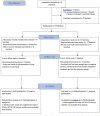Impact of Animal-Assisted Interaction on Anxiety in Children With Advanced Cancer and Their Caregivers
- PMID: 37751186
- PMCID: PMC10790544
- DOI: 10.1089/jpm.2023.0091
Impact of Animal-Assisted Interaction on Anxiety in Children With Advanced Cancer and Their Caregivers
Abstract
Background: Pediatric patients with advanced cancer and their caregivers have unique psychosocial needs. Anxiety often worsens throughout treatment for both patients and parents, and, if undertreated, can cause suffering. Animal-assisted interaction (AAI) incorporates animals into patient care in a structured manner for the purpose of therapeutic benefit. Objective: To evaluate feasibility of incorporating AAI into patient care and to assess AAI effectiveness in decreasing patient and caregiver anxiety in pediatric patients with advanced cancer, defined by relapsed or refractory disease. Design: Randomized controlled study. Setting/Subjects: Participants were children (n = 19) and parents (n = 21) who were randomized to AAI group or usual care (UC) group. Measures: Participants completed weekly measures to assess anxiety, including the 20-question State-Trait Anxiety Inventory (STAI). Results: Our results demonstrated feasibility of the use of AAI in children with advanced cancer. While they did not reveal a significant difference in anxiety scores over the four sessions in either group, parents randomized to the AAI group had lower STAI State subscores at initial visit in comparison to the UC group. The difference in initial STAI State anxiety scores for caregivers may indicate a positive effect of AAI in reducing anxiety surrounding appointments through anticipation of seeing a therapy dog. Conclusion: Further research is needed to determine the effectiveness of AAI in pediatric patients with advanced cancer and their caregivers, but results are promising that participation in AAI may lessen caregiver anxiety. Clinical Trial Registration Number is: NCT03765099.
Keywords: animal-assisted interaction; pediatric cancer; pediatric palliative care.
Conflict of interest statement
No competing financial interests exist.
Figures



References
-
- National Cancer Institute. Childhood Cancers. 2022. Available from: https://www.cancer.gov/types/childhood-cancers [Last accessed: January 30, 2023].
Publication types
MeSH terms
Associated data
Grants and funding
LinkOut - more resources
Full Text Sources
Medical

